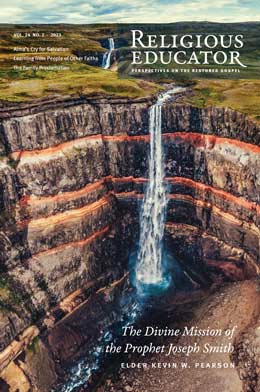Michael A. Goodman, "Editor's Note: Living Prophets," Religious Educator 24, no. 2 (2023): iii.
As Latter-day Saints, we believe God continues to lead his Church through living prophets. As Elder M. Russell Ballard taught, “It is no small thing, my brothers and sisters, to have a prophet of God in our midst. Great and wonderful are the blessings that come into our lives as we listen to the word of the Lord given to us through him. At the same time, knowing that [the President of the Church] is God’s prophet also endows us with responsibility. When we hear the counsel of the Lord expressed through the words of the President of the Church, our response should be positive and prompt.”[1]
This issue emphasizes blessings coming from prophets both past and present. We start with a stirring testimony of the Prophet Joseph Smith by Elder Kevin W. Pearson. Elder Pearson not only shares his testimony of the Prophet Joseph’s prophetic call but makes “a case for the divine calling of Joseph Smith” and the importance of each of us gaining and strengthening our testimony of the Prophet.
Two articles focus on the biblical and Book of Mormon prophetic witness. One describes how we as teachers can benefit and help our students benefit from resources and witnesses that come from people of other faiths as we seek to better understand the biblical record. The other looks at the prophetic witness of Alma related to Christ’s role as our Savior and Redeemer. The article examines how Alma used language like that in the Psalms and Lehi’s dream to testify of what he himself had come to know about the Savior. A third article focuses on ancient witnesses of Christ, who, though not necessarily prophets, gave their lives for their witness and shares lessons we can learn from their courageous lives. As a final focus on the ancient record, a beautiful poem speaks to the life and sacrifice of the Savior.
Two articles look at how modern prophets, starting with President Russell M. Nelson, began to provide enhanced documentation through source notes in general conference to their teachings and witness. What began with President Nelson became ubiquitous in how Church leaders share their teachings and witness.
Finally, three articles look at the role of our modern prophets in bringing forth “The Family: A Proclamation to the World.” Many have speculated on authorship and provenance of that sacred document. These three articles examine the political, cultural, and spiritual context in which the family proclamation was brought forth and examine what the prophets themselves have had to say about the nature of the document.
I hope this issue of the Religious Educator, with its emphasis on the role of prophets in God’s unfolding work, blesses you and those you teach.
Michael A. Goodman
Editor in Chief
Notes
[1] M. Russell Ballard, “His Word Ye Shall Receive,” Ensign, May 2001, 65.
